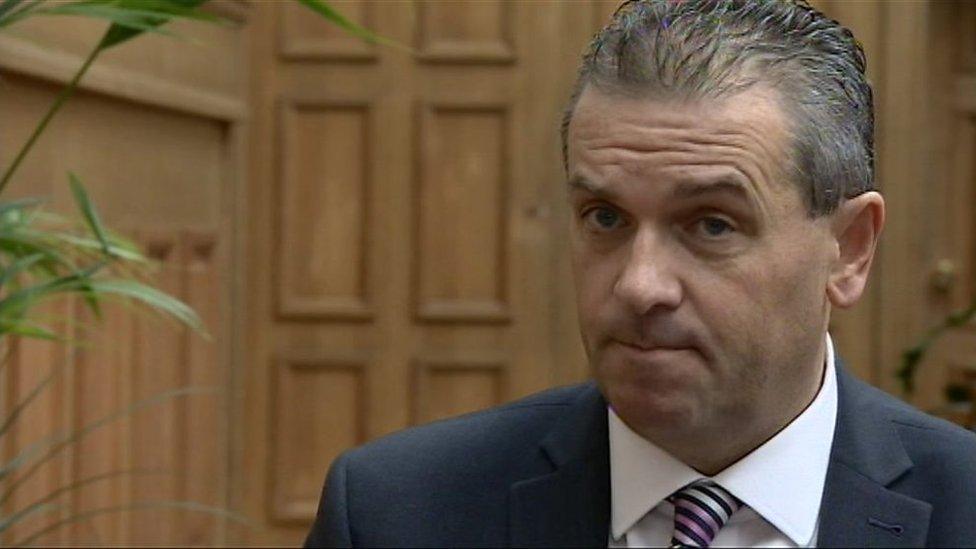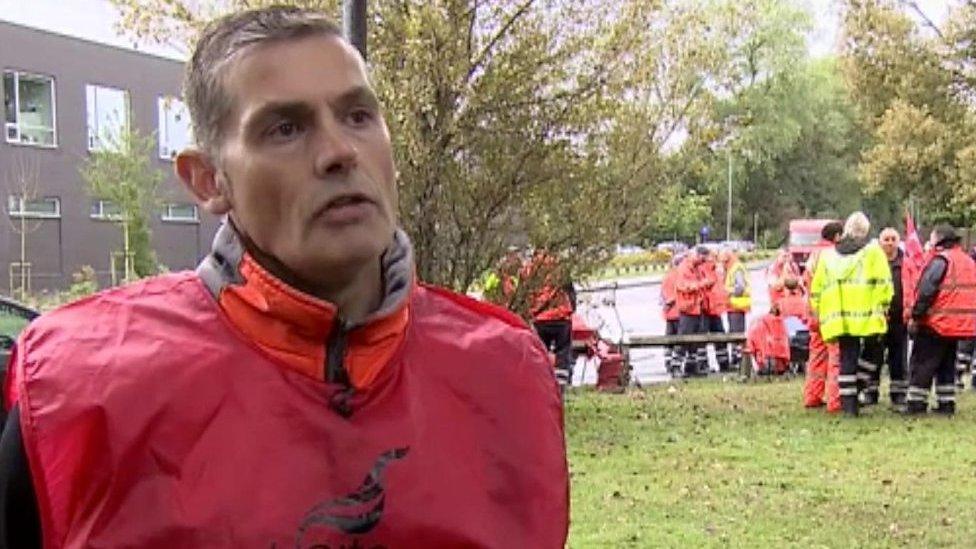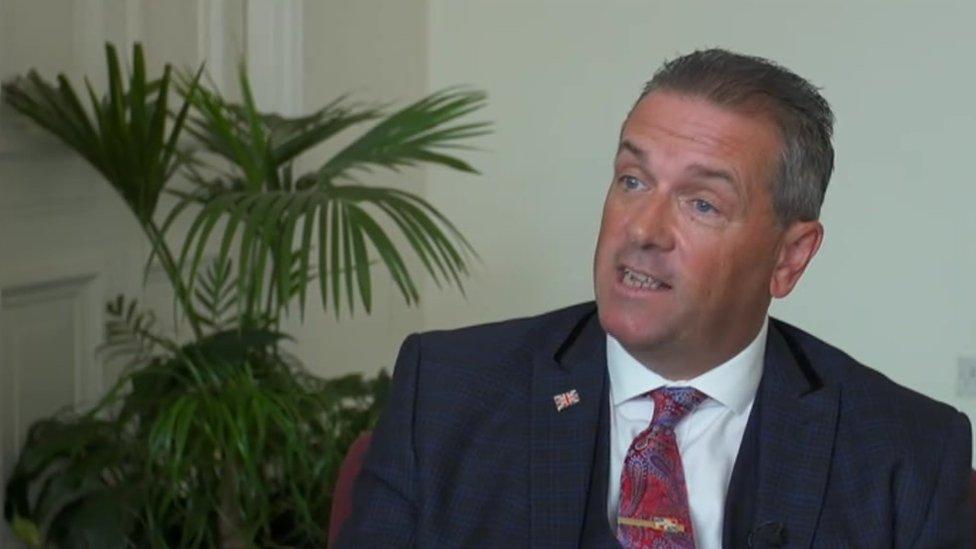Birmingham bin strike: John Clancy resigns as city council leader
- Published

John Clancy said he accepted he had made mistakes
The leader of Birmingham City Council, John Clancy, has resigned following criticism of his handling of industrial action by refuse workers.
In a statement, he said "frenzied media speculation" about the dispute, external was beginning to harm both the council and the Birmingham Labour Party.
Labour councillors last week proposed a no-confidence motion in Mr Clancy.
He said he accepted he had made mistakes "for which he is sorry" and takes "full responsibility".
The cost of Birmingham's bin strike
Workers resumed their strike on 1 September after a deal, which had seen the seven-week action suspended, fell apart.

Bin bags have piled up in Birmingham during the dispute
Mr Clancy, who has been leader of Birmingham City Council since December 2015, said the actions he took to negotiate an end to an "extremely complex and difficult industrial dispute were done with the best of intentions".
He also mentioned in his statement that "events in his personal life" had convinced him there were "issues of far more importance than Birmingham City Council".
Mr Clancy ended it by saying: "I really am looking forward to spending more time with my family."
Unite calls for Birmingham City Council chief executive to resign
Ian Ward is now acting leader of the council.
Refuse workers started strike action on 30 June in a dispute over job re-grading and shift patterns. The Unite union says restructuring plans threaten the jobs of more than 120 staff, while the council says the changes will modernise the service and save £5m a year.
The action was suspended on 16 August when conciliation service Acas said the city council had agreed certain posts would not be made redundant, and bin collections resumed.
But on 31 August, the council said it was issuing redundancy notices and the industrial action restarted the following day.
Urgent update
Mr Clancy's announcement came just after it emerged that the government has written to Birmingham's Improvement Panel asking it for an urgent update into events.

Unite is also calling for the council chief executive Stella Manzie to leave
The panel, which was overseeing the running of the council, was set up in 2014 following an inquiry into the so-called Trojan Horse letter and council services.
In August it said it was satisfied the council could continue under its own steam.
But Sajid Javid, Secretary of State for the Department of Communities and Local Government has written to the panel saying that "clearly, there have been some developments since then which could have major implications" both for the council's leadership and finance and asked for an urgent update before he decided what the next steps should be.
Andy Street, Metro Mayor for the West Midlands, tweeted to say Mr Clancy has been a "generous colleague".
Allow X content?
This article contains content provided by X. We ask for your permission before anything is loaded, as they may be using cookies and other technologies. You may want to read X’s cookie policy, external and privacy policy, external before accepting. To view this content choose ‘accept and continue’.
Unite's assistant general secretary Howard Beckett told BBC WM Mr Clancy "made a mistake by claiming there was no deal in place when everybody knew there was and Acas recorded the deal".
"I'm just sorry the whole situation has got to this. He did an honourable deal and, I believe we would have had a settlement long ago and he made a crucial error."
Mr Beckett also stated interim chief executive of Birmingham City Council, Stella Manzie, "must follow in John Clancy's footsteps and resign".

Residents in one part of the city marked 50 days since their rubbish had last been collected
"Stella Manzie has twice blocked Unite lawyers meeting council lawyers to discuss the fictitious equal pay concerns she is using to scupper the agreement that Unite reached with the council at Acas.
"John Clancy in his statement has made it clear this agreement was reached with the full knowledge of the cabinet."
Birmingham's nine Labour MPs had previously written a letter describing the city council as "an obstacle to moving forward" in resolving the bin strike.
In the letter addressed to Mr Clancy, MPs said delays to finding a solution were "unacceptable".
The Labour-run council said a swift end to the dispute was its "top priority".

Rubbish piles up in Sparkhill, Birmingham
David Jamieson, the Police and Crime Commissioner for the West Midlands, said Mr Clancy "made the right choice" to resign.
"He's stood back because he feels he's an impediment to Birmingham going forward. Birmingham has an excellent set of councillors to choose from to choose a new leader."

Analysis by Kathryn Stanczyszyn, political reporter, BBC Birmingham
John Clancy's resignation was seen as inevitable by some following his comments there was never any deal with Unite over the bin dispute.

Unite have made it clear they feel a deal was not honoured
What followed was a series of allegations and reported evidence there had indeed been some kind of deal - and not only that, but John Clancy had overstepped the mark and overplayed his hand in promising it.
Whilst many people believe his intentions were good, his failure to admit mistakes in that crucial 'no deal' interview meant there was nowhere to go.
Confidence in the leader was crumbling and his resignation may have been influenced by three things: a critical letter from Labour MPs, a reported private meeting of his cabinet where all but one called for him to step down, and a government letter asking for an 'urgent update' from the independent panel monitoring the way the council keeps its house in order.
Unite have made it clear they feel they have a deal and they want it honoured. And that could mean strike action for some time to come.

Birmingham bin workers: "We just want to work"
- Published8 September 2017

- Published8 September 2017

- Published4 September 2017
